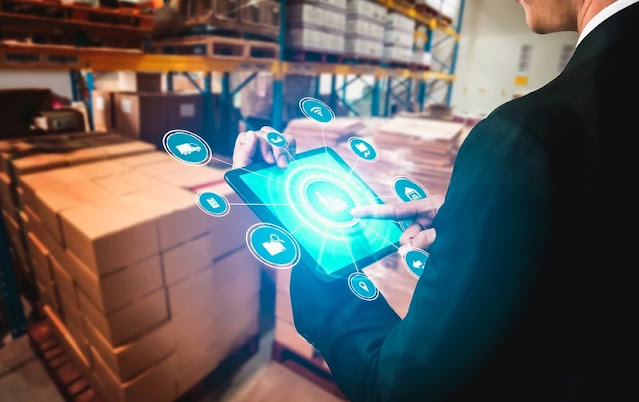Supply Chain and Industry 4.0: What's the Future?
Global supply chains have been challenged by the Covid-19 pandemic, natural disasters, geopolitical conflicts, and simple human error in recent years. The bright side is that every global event that impacts supply chains is a valuable lesson that strengthens them.
Let's explore what can and should be changed in modern supply chains to increase sustainability and what role Industry 4.0 plays.

Supply Chain Today: What's Wrong?
One of the crucial issues of the modern supply chain is that it is not a traditional chain with connected links. Instead, it is a collection of siloed steps, including product development, production, marketing, distribution, and delivery.
These departments often work independently, without the rapid data exchange, which is the key to prompt and wise decision-making. The lack of data visibility and real-time communication between departments will inevitably lead to supply chain disruptions affecting the entire enterprise.
To avoid them, businesses should:
● Improve connectivity to business partners and stakeholders to ensure high-level collaboration.
● Establish real-time cooperation between departments to become more flexible to any market changes, predict and quickly respond to disruptions.
● Increase company productivity with its digitalization.
Build Supply Chain Resilience With Industry 4.0
Businesses that had already launched their digitalization point out that they started accelerating their planning and projects. But before we discover what role is given to Industry 4.0, let’s learn what it is.
Briefly on Industry 4.0
The phrase “Industry 4.0” signifies the 4th industrial revolution. It is a process that is produced by enforcing the IoT (Internet of things). The Internet of things (IoT) technologies into the production and valuable manufacturing conditions. Today, Industry 4.0 ensures automated production of goods, as well as supply and delivery, almost without any human involvement.
Then how do processes work? Industry 4.0 technologies connect all machines in a single network within an intelligent enterprise. It allows them to exchange all the necessary data and control each other autonomously. In other words, it is a full-fledged cyber-physical system (CPS).
Moreover, Industry 4.0 also includes the Industrial Internet of Things (IIoT), cloud technologies, cognitive computing, and artificial intelligence (AI).
Digitalization with Industry 4.0
So, how can businesses benefit from Industry 4.0? It combines enterprise operation execution automation, which turns the entire digitalization process into a competitive business strategy. This approach also involves the use of advanced logistics and employee empowerment.
Supply chain digitalization implies a new interconnected business system that extends from isolated, local, and single-company applications to supply chain-wide systematic, intelligent implementations.
Supply Chain 4.0
So, what characteristics should modern supply chains have to harmoniously integrate into the fourth industrial revolution and meet the current market requirements?
● Customer-centric. It implies developing and producing individualized goods and services with an omnichannel approach and innovative technologies.
● Interconnected. Partners, suppliers, and customers are united into a single network where they communicate and collaborate in real-time.
● Automated. Business process automation with robotics helps companies to improve their efficiency.
● Transparent. With innovative technologies such as GPS and CPS, you can improve the visibility of every supply chain link and trace products in real-time.
● Proactive. The modern supply chain must be built on a data-driven approach. Real-time data analytics helps decision-makers react anticipatorily to changing conditions and unexpected events.
As supply chains will be increasingly digitized by adopting the Industry 4.0 approach, they will transform into supply chain ecosystems that are fully transparent to all the players involved — from the suppliers to the customers.
This supply chain ecosystem will be based on the following technologies:
● Integrated planning system
● Execution system
● Logistics visibility
● Autonomous logistics
● Smart procurement & warehousing
● Spare parts management
● Advanced analytics
What is the result? Companies can foresee supply chain disruptions and promptly respond to them by modeling the network, creating “what-if” scenarios, and adjusting the supply chain in real time.
We are at the Opening of the Road
Industry 4.0 technologies help companies combine design, production, delivery, and operation solutions into an interconnected system. This approach streamlines data exchange and process automation, increases transparency, and improves efficiency.
Creating a full-fledged supply chain ecosystem provides businesses with a new level of resiliency and responsiveness. Every link will give a complete picture of others’ needs and challenges.
Companies that will create such an ecosystem first will gain a difficult-to-challenge advantage and will be able to influence their industry and set its technical standards.

No comments